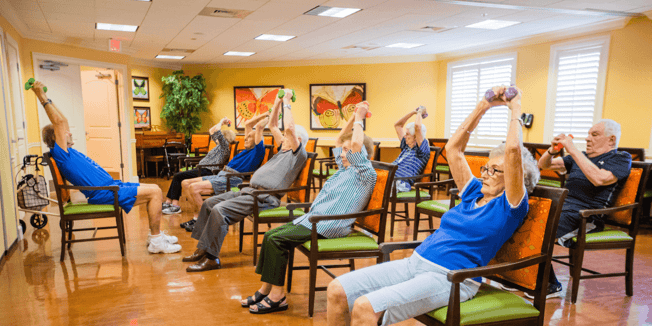Find expert Memory Care staff providing personalized senior care.
Understanding Exactly How Helped Living Sustains People With Mental Deterioration Care Requirements
Helped living facilities are increasingly recognized for their crucial role in dealing with the complex care demands of people with mental deterioration. By using a structured yet supporting atmosphere, these centers not only promote safety and security and well-being but likewise cultivate a sense of autonomy via customized care plans.
Summary of Dementia Treatment
Dementia treatment is increasingly important as the prevalence of dementia-related conditions climbs amongst aging populations. The problem can differ considerably in its discussion, needing customized care techniques to fulfill specific requirements.
Effective mental deterioration care entails a multidisciplinary approach, integrating clinical, emotional, and social assistance. Healthcare professionals, caretakers, and member of the family should team up to produce a nurturing atmosphere that promotes the well-being of people with mental deterioration. Trick parts of mental deterioration care include customized care plans, cognitive excitement therapies, and behavioral treatments targeted at boosting lifestyle.
Additionally, it is necessary to identify the psychological and emotional challenges encountered by both patients and caretakers. Education and learning and training for caretakers play a pivotal duty in cultivating understanding and compassion, thereby improving interactions with those affected by mental deterioration. As the need for dementia care continues to climb, the emphasis has to continue to be on supplying thoughtful, person-centered care that values the self-respect and choices of individuals living with this problem.
(Assisted Living Charlotte)
Function of Assisted Living Facilities
Helped living facilities play a crucial duty in offering take care of individuals with dementia, using an encouraging setting that stabilizes self-reliance with the needed help. These centers are designed to deal with the distinct requirements of locals, promoting a sense of community while making certain safety and security and wellness.
In an assisted living setting, qualified personnel provide ongoing support, assisting with daily activities such as showering, dressing, and drug administration. This degree of care is important for individuals with mental deterioration, who may struggle with these jobs because of cognitive decrease. Furthermore, facilities commonly integrate memory-enhancing programs and social tasks customized to boost cognitive functioning and urge social interaction.
The physical atmosphere of assisted living facilities is additionally enhanced for safety, including safe and secure entrances, well-lit paths, and clear signage to assist residents browse their surroundings. Moreover, these communities promote a sense of belonging, minimizing the feelings of seclusion that individuals with mental deterioration may experience.
Personalized Care Program
To guarantee that each resident receives the most appropriate care, individualized treatment strategies are necessary in assisted living facilities for individuals with dementia. These strategies are tailored to satisfy the one-of-a-kind needs, preferences, and difficulties faced by each local, advertising their dignity and quality of life.
The growth of a personalized treatment plan commonly starts with a thorough evaluation performed by healthcare professionals. Assisted Living. This analysis reviews the person's cognitive capacities, physical health, psychological wellness, and social choices. Input from household participants and the resident themselves is crucial, as it gives important insights into their history, routines, and individual interests
Once the evaluation is total, a multidisciplinary group works together to produce a treatment strategy that outlines specific goals and interventions. This may include medication monitoring, daily living support, and behavior approaches tailored to alleviate anxiety or anxiety.
Regular evaluations and updates to the care strategy guarantee it continues to be pertinent as the individual's problem advances. Memory Care. By focusing on personalized treatment, helped living facilities can enhance the general health of homeowners with mental deterioration, promoting an atmosphere that appreciates their uniqueness while addressing their care requires successfully
Involving Tasks and Socializing
Involving activities and socialization play an essential function in improving the lifestyle for residents with dementia in nursing home. These activities are designed to boost cognitive function, advertise psychological wellness, and foster links amongst locals. Organized programs, such as art treatment, music sessions, and memory therapy, provide opportunities for individuals to share themselves creatively while additionally activating favorable memories.
Socialization is just as critical, as it fights sensations of seclusion and loneliness that can accompany mental deterioration. Group tasks, consisting of video games, group getaways, and communal dining, motivate communication and help homeowners develop helpful relationships with peers and caretakers. This sense of neighborhood not only enriches their day-to-day experiences but likewise adds to a much more stable emotional environment.
Moreover, engaging tasks can be tailored to specific choices and cognitive levels, ensuring that each homeowner can take part meaningfully. By developing an environment that prioritizes engagement and social communication, assisted living facilities can dramatically improve homeowners' general psychological wellness, fostering a sense of objective and belonging. Eventually, these efforts are vital elements of thorough dementia treatment, dramatically impacting locals' overall health and joy.
Advantages of Community Support

Furthermore, community assistance advertises social communication, which is important for cognitive and psychological health and wellness. Engaging with peers and taking part in group tasks can enhance state of mind and encourage reminiscence, adding to a higher sense of belonging. This social interaction is vital, as isolation and seclusion can intensify cognitive decline.

(Memory Care Charlotte)
Final Thought
Finally, assisted living facilities function as important atmospheres for individuals with dementia, supplying organized assistance that promotes both independence and security. The application of individualized care strategies ensures that each resident's Go Here one-of-a-kind needs are satisfied, while involving activities advertise social interaction and cognitive engagement. The sense of community within these centers substantially minimizes feelings of seclusion, boosting total emotional well-being. Thus, assisted living plays an essential duty in boosting the top quality of life for people with dementia.